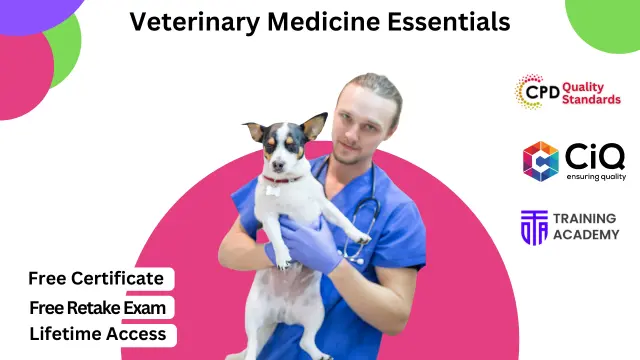
Veterinary Medicine Essentials
CPD Accredited ! Free Certification | FREE Retake Exam | Lifetime Access | No Hidden Fees
Online Training Academy
Summary
- Digital certificate - Free
- Reed Courses Certificate of Completion - Free
- Tutor is available to students
Add to basket or enquire
Overview
The Veterinary Medicine Essentials Course offers a comprehensive understanding of veterinary practices, crucial in today's world where the health and well-being of animals are paramount. With modules covering diverse topics such as making diagnoses, practical antimicrobial therapeutics, and clinical procedures, this course equips learners with essential skills. In an era where biosecurity and infection control are increasingly vital, mastering these concepts is indispensable.
The demand for veterinary professionals continues to surge, with job opportunities abundant, especially in the UK. After completing this Veterinary Medicine course, individuals can secure positions in veterinary clinics, research facilities, or governmental agencies. According to recent data, entry-level salaries for veterinary professionals in the UK average around £30,000 per annum, with ample room for growth.
Advantages of pursuing this course include a 15% projected increase in job opportunities over the next decade, reflecting the growing need for skilled professionals in the field. With a solid foundation in Veterinary Medicine, individuals are poised to make significant contributions to animal health and welfare worldwide.
Key Features:
- CPD Certified Veterinary Medicine Course
- Free Certificate from Reed
- CIQ Approved Veterinary Medicine Course
- Developed by Specialist
- Lifetime Access
CPD
Curriculum
Course media
Description
Course Curriculum:
- Module 01: Introduction to Veterinary Medicine
- Module 02: Making a Diagnosis
- Module 03: The Physical Examination
- Module 04: The Medical History
- Module 05: Biosecurity and Infection Control
- Module 06: Practical Antimicrobial Therapeutics
- Module 07: Diseases of the Alimentary Tract
- Module 08: Diseases of the Liver and Pancreas
- Module 09: Diseases of the Cardiovascular System
- Module 10: Diseases of the Haemolymphatic and Immune Systems
- Module 11: Diseases of the Respiratory System
- Module 12: Diseases of the Urinary System
- Module 13: Diseases of the Nervous System
- Module 14: Diseases of the Musculoskeletal System
- Module 15: Diseases of the Skin, Eye, Conjunctiva, and External Ear
- Module 16: Diseases of the Mammary Gland
- Module 17: Decision Making in Veterinary Emergency Medicine
- Module 18: Veterinary Herbal Medicine
- Module 19: Clinical Procedures
- Module 20: Diagnostic Procedures
- Module 21: Veterinary Medicine for Exotic Pets, Zoo and Wildlife Species
Learning Outcomes:
- Analyze symptoms and history for accurate veterinary diagnosis and treatment.
- Implement biosecurity measures to prevent infectious disease spread effectively.
- Apply antimicrobial therapies to address various animal health conditions effectively.
- Identify and manage diseases affecting different body systems in animals.
- Perform emergency veterinary procedures with confidence and proficiency.
- Utilize herbal medicine as complementary therapy in veterinary practice.
Who is this course for?
This Veterinary Medicine Essentials course is accessible to anyone eager to learn more about this topic. Through this course, you'll gain a solid understanding of Veterinary Medicine Essentials. Moreover, this course is ideal for:
- Aspiring veterinarians seeking comprehensive foundational knowledge in veterinary medicine.
- Veterinary nurses aiming to enhance their diagnostic and treatment skills.
- Animal care professionals desiring a deeper understanding of animal health management.
- Wildlife enthusiasts interested in veterinary care for exotic and zoo animals.
- Pet owners keen on understanding basic veterinary principles for pet care.
Requirements
There are no requirements needed to enrol into this Veterinary Medicine Essentials course. We welcome individuals from all backgrounds and levels of experience to enrol into this Veterinary Medicine Essentials course.
Career path
After finishing this Veterinary Medicine Essentials course you will have multiple job opportunities waiting for you. Some of the following Job sectors of Veterinary Medicine Essentials are:
- Veterinary Surgeon - £31K to 72K/year.
- Veterinary Nurse - £21K to 35K/year.
- Animal Welfare Officer - £18K to 30K/year.
- Zoologist - £24K to 45K/year.
- Wildlife Rehabilitation Officer - £18K to 35K/year.
Questions and answers
Currently there are no Q&As for this course. Be the first to ask a question.
Certificates
Digital certificate
Digital certificate - Included
Reed Courses Certificate of Completion
Digital certificate - Included
Will be downloadable when all lectures have been completed.
Reviews
Currently there are no reviews for this course. Be the first to leave a review.
Legal information
This course is advertised on reed.co.uk by the Course Provider, whose terms and conditions apply. Purchases are made directly from the Course Provider, and as such, content and materials are supplied by the Course Provider directly. Reed is acting as agent and not reseller in relation to this course. Reed's only responsibility is to facilitate your payment for the course. It is your responsibility to review and agree to the Course Provider's terms and conditions and satisfy yourself as to the suitability of the course you intend to purchase. Reed will not have any responsibility for the content of the course and/or associated materials.


